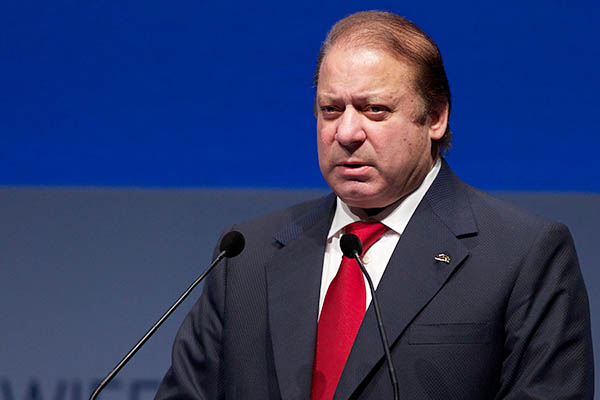Interior minister’s claims of complete ‘rethink’ of Pak-U.S. ties to be considered following death of TTP chief Hakimullah Mehsud in drone strike.
Prime Minister Nawaz Sharif is to chair a meeting of his top security advisers Monday evening to review relations with the U.S. following the drone strike that killed Taliban leader Hakimullah Mehsud.
The killing of the feared chief of the Tehreek-e-Taliban Pakistan (TTP), which is blamed for killing thousands in a six-year battle against the state, in a drone attack on Friday sparked a furious response from Islamabad.
The government was taking the first steps towards initiating talks with the militants when Mehsud was killed, prompting Interior Minister Chaudhry Nisar to accuse Washington of “scuttling” peace efforts.
Afghan President Hamid Karzai added his voice to criticism of the U.S., saying the killing of Mehsud came at “an unsuitable time” and hoping the peace process did not suffer as a result.
Sharif came to power in May partly on a pledge to hold talks to try to end the TTP’s bloody insurgency that has fuelled instability in the nation.
On Saturday a furious Nisar said “every aspect” of Islamabad’s ties with Washington would be reviewed by the cabinet security council, at a time when they appeared to be warming after lurching from crisis to crisis in 2011 and 2012. Opposition parties led by Imran Khan’s Pakistan Tehreek-e-Insaf (PTI) party have demanded the government close Pakistan’s roads to convoys supplying NATO forces in Afghanistan.
PTI has said it will block NATO convoys in Khyber-Pakhtunkhwa, where it is in power, which would cut off one of the main crossing points into Afghanistan.
Pakistan blocked NATO convoys for seven months in 2012 after a botched U.S. air raid killed 24 troops.
With NATO withdrawing 87,000 troops from Afghanistan by the end of next year after 12 years of war, the ground supply lines through Pakistan are of vital importance.
Anti-American sentiment runs deep in Pakistan and drone strikes are hugely unpopular, with many criticizing them both for civilian deaths and as a violation of sovereignty. But after the heated rhetoric of the weekend, Sharif and his government must weigh the practicalities of their response carefully in the light of improving relations with a vital financial partner.
Last month U.S. President Barack Obama welcomed Sharif to the White House and the State Department announced the release of $1.6 billion in aid, including $1.38 billion for the country’s military. The money had been frozen as relations plummeted amid a series of crises in 2011 and 2012 including the U.S. raid to kill Osama bin Laden at his hideout in Pakistan—carried out without Pakistani knowledge.
Washington has said the issue of whether to negotiate with the TTP was an internal matter for Pakistan but stressed the U.S. and Pakistan had “a vital, shared strategic interest in ending extremist violence.”
The TTP announced on Sunday that Asmatullah Shaheen Bhittani, the head of the militants’ supreme council, had been appointed as temporary leader while a permanent replacement for Mehsud is chosen. Bhittani, who was seen as close to Mehsud, has been touted as a potential permanent replacement, as has the movement’s number two Khan Said, alias Sajna.

